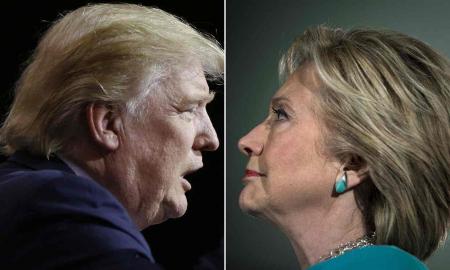by Dan Roberts
The election the world thought would never end at least began predictably – an hour and 50 minutes after the last one was over.
This was how long it took one presidential hopeful, Kentucky senator Rand Paul, to first start campaigning against Hillary Clinton when polling closed two years ago in the midterm elections. It was to prove almost the only thing that went to script. What happened next would change the certainties of American politics forever.
That a woman might become a major party nominee and then president of the United States was seen as a historic enough opportunity: a moment to prove once and for all that no job should be a male preserve and no woman need curb her ambition. Yet almost everyone assumed Clinton would be squaring off against one of a pack of Republican politicians.
It was hard to conceive that she might stumble on her way to this feminist showdown thanks to Bernie Sanders, a self-described socialist who nearly upended the Democratic party primary. Even more implausibly, Donald Trump, a television reality show host and property developer who was neither a politician nor, arguably, a Republican, would sweep all of his primary election rivals aside in a landslide. No scriptwriter could have imagined how close this would lead America toward what many critics came to fear was a form of fascism.
Trump was labelled with other ‘isms’ too – racist, sexist, nationalist – some of them even by his own supporters; all of them disputed by him. But it was his fondness for authoritarianism and flair for demagoguery that led most to unflattering comparisons with the political landscape of the 1930s. Who could have guessed that with some deft mutations for the media age, this virus would come so close to overwhelming the world’s most powerful democracy in the 21st century? Or how grateful many Democrats would be that the American strain arrived wrapped up in a candidate with such obvious flaws?
Theories abound for why Trump decided to run for office. Some say he was stung into action by a humiliating tongue-lashing he received from Barack Obama at 2011 White House correspondents’ dinner. Witnesses to the event differ on whether Trump was goaded into seeking revenge or merely flattered by the attention, but he was teased mercilessly for trying to prove the president was born in Kenya. This unlikeliest of public servants began his political life as the anti-Obama candidate, seeking to ride the swinging pendulum away from a high point in racial equality and shifting into opposition to the equivalent moment in women’s emancipation.
It was a crowded field. Former Florida governor Jeb Bush was long seen as the Republican frontrunner and raised more money within weeks than his self-described billionaire opponent was ever to contribute to the presidential campaign. Yet Bush was to flop disastrously at the first brush with actual voters. His measly three delegates in the Republican primary election – 0.2% of the total needed to secure the nomination – were to cost $50m a piece. Fifteen other candidates copied his ignominious exit from a one-sided Republican primary that felt like an election all of its own. . .
To read the full piece from The Guardian, click here.

